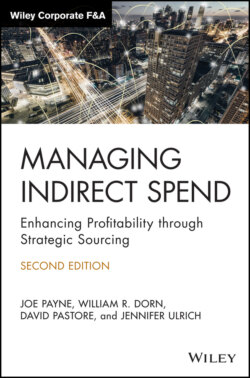Читать книгу Managing Indirect Spend - Joseph Payne, Joe Payne - Страница 69
Alternative Processes, Products, and Services
ОглавлениеDuring initial discussions with end users, you may learn that stakeholders are set in their ways. Professionals sometimes develop the mindset that they need to order supplies in a certain way, need specific reports provided on specific days of the week, or need suppliers that are certified (to the end user's satisfaction) in specific processes, software, and quality control methodologies.
Sometimes there are good reasons for these requirements. Many end users have worked hard to discover what they believe to be the best and most efficient processes or best types of suppliers for your organization. It's possible these choices have historically enabled them to prioritize activities that are aligned to their individual goals and objectives while adding more value to the organization. In other cases, these requirements were developed based on what was most familiar to the end user or because the end user did not want to learn something new. In some cases, the requirements were actually developed by the existing supplier, carefully and intentionally implemented under the guise of free training.
What end users often fail to realize is that mandating specific processes or other service requirements onto the supply base without considering alternatives can add costs that exceed any efficiencies they provide. First, stringent service requirements can add to the unit cost of the product or service being purchased. You may not get charged extra for those additional customized reports you receive from your current supplier, but it's possible the supplier factored the cost to produce the reports into the unit cost of the item you are purchasing.
Second, developing specific requirements that only a small number of suppliers can meet limits competition and eliminates alternative processes or enhancements that may be more beneficial to your organization. An example of this might be mandating that your supplier have a certain number of years servicing companies in the same market as your organization. Some end users do this intentionally to limit the number of bidders who can respond to an initiative. This inevitably makes the process easier, but often means missing out.
Another common example of a needless personal requirement is looking for a particular software certification from a supplier as it relates to the company's reporting or transaction management functions in the ERP system. Oftentimes, end users require that any alternate supplier have the same level and type of certification that their current supplier has. Many suppliers can integrate into the major ERP systems or other common software used by most businesses. However, not all suppliers expend the time, energy, and money to go through the process of becoming certified with a particular software publisher. There are many reasons for this; the primary one is that software publishers charge to certify—and these costs can be substantial. Companies go through the certification process to distinguish themselves as partners of a particular software publisher and use that certification in their own marketing, but certification in itself does not always prove that one company is more qualified than another to integrate with a particular system. Ultimately, the only real difference you can confirm (without further research) between a company with a certification and one without is that the certified company paid for the certification.
In this scenario, if you require some level of integration between your systems and those of your supplier, the real requirement is that the supplier is capable of achieving that integration. This might mean it has experience with your particular software or similar software programs. It could even mean that the company partners with a third party that is certified. To achieve proper supplier integration, you need to work with your IT team to determine the types of information being shared, the formats of that information, and all other relevant technical details. Having a certified supplier with demonstrated experience will bolster your confidence that they can deliver on your requirements, but it does not necessarily mean that they can provide the most value to your organization.
When evaluating alternate processes and products, consider what role the current supplier may have played in helping develop the requirement. This is especially true when long‐term suppliers are involved or when it appears that only one or two suppliers can appropriately serve your needs. Suppliers usually have a very detailed knowledge of the marketplace and understand the differences between their offerings and those of their competitors. They often customize requirements for products or services to ensure that no other supplier in the marketplace favorably compares during an apples‐to‐apples assessment. This makes understanding the history of a supplier relationship—and who was involved in developing the initial requirement—all the more important.
